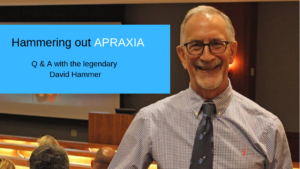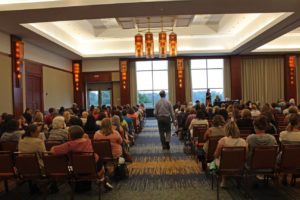Hammering out apraxia with David Hammer
Hi Dave! Thank you so much for coming on to guest blog! You know you are famous in the world of apraxia, so I am honored you are willing to guest blog! Your contributions to the field of Speech/Language Pathology and more specifically apraxia are inspiring. It’s an absolute honor to know you and I can’t thank you enough, speaking as a mother of a child with apraxia, for all you have done to advance the field. Recently, you just announced your retirement set for the end of this year. Though I am sad, I am so grateful for your enormous contribution to the field and am so happy you joined me today to share your knowledge! I normally pick a specific topic, but for you, my readers wanted to ask questions related to apraxia and see what you had to say!
I feel humbled by your kind words, Laura, and also feel blessed to have been in this great field for 40 years. I will return the thanks for all that you have done in the Apraxia community as you wear the hats of an SLP and a mother of a child with apraxia. I often talk in my presentations about how SLPs have to wear so many hats – their SLP hat, their parent counselor hat, their psychologist hat, their OT/PT hat, etc. given that we are dealing with the “whole” child and not just the “hole” where speech emerges! I applaud anyone in this profession that looks at children this way. I am fine with answering a wide range of questions so I will proceed…
Can you start though by introducing yourself first including how and why you became interested in apraxia? Also, what is your involvement with Apraxia Kids?
I started out working for Children’s Hospital of Pittsburgh, PA after graduating from the University of Pittsburgh. Through my first office window I look directly at the building that housed the speech clinic where I was trained! I began to specialize in stuttering but then Luke Lasky, Sharon Gretz’s son, came into my life through a referral from my esteemed boss, Dr Tom Campbell. It wasn’t long before I became fascinated by this challenging motor speech disorder and from that point, my career passion changed. Having been a part of the beginning stages of what is now known as Apraxia Kids has been quite rewarding. To see this organization grow from 2 parents observing their 2 boys with CAS through my two-way mirror in dyad treatment to what it is today is remarkable. I left Children’s Hospital after 35 years as a practicing therapist and administrator and joined the Apraxia Kids staff (then CASANA) where I have been the last 5 years. I recently announced my retirement plans for the end of 2019. It has been quite a journey!
Is it necessary and beneficial to get an MRI or do specific genetic testing or any type of medical testing for that matter. If so, why?
This is always a challenging question and one that I answer for parents often. Let’s start with discussing a neurology appointment. I do not feel that all children with CAS need to see a neurologist, unless they demonstrate what we call “soft signs” such as clumsiness, inability to cross midline, hand tremors, imbalance, staring spells, etc. In those cases you would want to rule out other potential medical diagnoses. But to ask a neurologist who likely had very minimal training on CAS to evaluate whether or not a child (who is usually very reluctant in a physician’s office) shows features of CAS is unfair and could potentially lead to misdiagnosis. Also, CAS is not a medical diagnosis. Studies have concluded that a high percentage of children with CAS show normal MRIs. There is no conclusive brain imaging or genetic tests to diagnose CAS. It is a clinical diagnosis to make and should be done by a speech-language pathologist. The child’s SLP may suggest genetic testing or neurological testing if they see indicators of other concerns but to routinely have all children get an MRI, have genetic testing done, or a neurological examination is not what I recommend. Unfortunately, some of our SLPs in Canada in certain provinces are required to send all children to a physician to get a CAS diagnosis which can certainly slow the process of getting children the therapy help they so desperately need. Some parents just want to make sure every rock has been overturned and will seek out genetic testing and/or neurological testing. I would never stop them from doing that but will discuss the pros and cons.
What are other conditions that are common with Childhood Apraxia of Speech?
I would say fine motor planning struggles, sensory issues and anxiety are 3 that come to mind first. I added anxiety to that list just recently as I talk to more and more parents and SLPs about how children who struggle to communicate seem to have more anxiety than is typically seen. It makes sense when you think about it as communication is such a vital part of what makes us human and social beings.
For the child with profound apraxia, where do you even start?
First of all, you must make sure that the child has the foundational skills for communication such as joint attention, ability and willingness to imitate (any motor movements), and a certain level of cognitive ability. Some of the children can’t make use of motor speech therapy until those foundational skills are in place and a lot of time is wasted just trying to get speech first. If those foundational skills are intact or to a point where the child can benefit from therapy, then the starting point would be for me building on whatever the child has in their vocal/verbal repertoire. We can use expressions, animal noises, vehicle sounds to build speech from creatively. The foundational element is the syllable for motor speech work so we would not work much in isolation but would constantly be looking at sequencing sounds to build motor plans. I would work on a very few words in the initial stages when a child has profound CAS to build these motor plans in hopefully functional ways. The targets for this early practice are critical and should allow for the child to feel early success or they will lose their motivation for trying quickly. Speaking for them is very challenging, and it is not much fun to have to repeat syllables and words over and over, so to get them to take vocal/verbal risks is the challenge for the SLP and parent/caregiver alike.
Is it possible for a child to have apraxia, sensory issues, and other language disorders such as Mixed Expressive/Receptive Language Disorder and it not automatically be autism?
For sure. I have seen a number of children for evaluations who come in with a diagnosis of autism spectrum disorder who really reflect severe CAS with mild-moderate sensory issues. I also see it the other way around where parents are holding on to a CAS diagnosis when it is apparent that the child is also showing features of autism. For some parents, they think that when the speech symptoms “go away” their child will just be like all other children, but this is not always the case when there are complicating dual diagnoses. I can certainly understand why parents would hold on to something that appears more “fixable” despite the challenges that CAS brings.
Is there any research on regression in speech motor planning when a child has a growth spurt?
I know of no evidence of this, but my psychology and child development training throughout the years coupled with my experience show me that there is always a chance of regression and or behavioral change when there is a growth spurt that sets the “system” in a whirlwind until it can again settle down. It’s an interesting question and one that would be fascinating to study. Overall, however, we do not see significant regression in speech for children with CAS. We are likely to see what I call the “plateau effect” where there are periods of leveling off of progress while a child is apparently consolidating his/her gains. I stress to parents that they should think of these as “input phases” where their verbal input, practice, etc should still continue and even heightened despite the output not changing much. Then you tend to see this followed by a spurt of progres but it often cycles back. The journey of CAS is not a straight line of progress.
You’ve presented before on best practices for apraxia with a co-morbidity of autism. Are there any resources available for this?
There are not many resources currently. Key points to be made here have to do with differential features, for example children with CAS ofen averting eye gaze due to lack of communication success and children on the spectrum often avoiding eye contact due to perceived aversiveness to looking an another’s face. Both groups may demonstrate sensory issues which is why misdiagnosis is so easily done. One article from the April 2011 Journal of Autism and Developmental Disorders comes from Larry Shriberg and his group called “The Hypothesis of Apraxia of Speech in Children with Autism”.
Is there a connection between apraxia and reading struggles?
A very high percentage of our children with CAS struggle with reading and show evidence of struggles in the preschool ages with foundational phonological awareness skills. It is critical that SLPs and parents make sure there are foundational elements of literacy incorporated into therapy sessions and home practice/stimulation. There is nothing better for parents to do then read to their children daily. I usually suggest at least one book for pleasure and one that incorporates some degree of speech practice time. I think this is one of the biggest frustrations I hear from parents – just when they think the child is overcoming the motor speech challenges, along comes major literacy struggles which then pervade learning in school. It is this constant “getting over the next hurdle” that requires a lot of perseverance for parents.
Do difficulties eating or picking eating often accompany apraxia?
As I mentioned before, with seeing so many children with CAS having sensory issues of one degree or another, it would make sense that picky eating may be a component of these sensory deficits. It is difficult to sort out whether there is oral planning challenges contributing to eating difficulties and the possibility that it may be more of a weakness issue (e.g. a child with dysarthria or combined CAS/dysarthria) needs to be investigated.
Let’s end it with something fun. Do you prefer plain socks or fun socks?
On me or on others? – haha! I would say I tend to wear plain socks most of the time, but when I was a practicing therapist, I had a LOT of fun kid-themed ties that I think helped children feel even more comfortable when they came to see me. Oh, I do have a pair of dinosaur socks that were gifted to me by a child’s parent when her child ended therapy, knowing that a major theme in our therapy had been dinosaurs! Ironic that I just bumped into that parent and her now older child when I went to see Hamilton the other night! Both experiences were amazing as I marveled at what Lin-Manuel Miranda and this parent/child duo had accomplished!
Thank you so much Dave! It’s been an honor to have you, to know you, and to consider you a mentor and friend! Your contribution to the field cannot be measured. As a mother to a child with apraxia, I’m so grateful to you.
…and I am so grateful for you, all the parents/caregivers out there on this journey, the children who truly are superheroes, and the SLPs who passionately want to help, ALL of whom have inspired me in this field!

